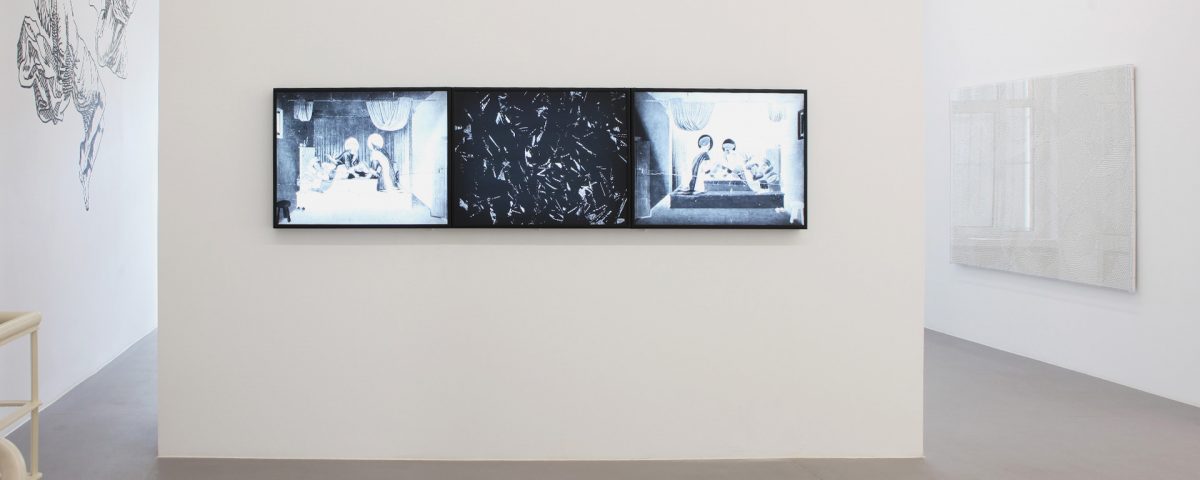
MOUNIR FATMI
10/09–22/11/2011
We are delighted to present the solo exhibition “The Angel´s Black Leg” by Mounir Fatmi, one of the most internationally renowned artists from the Arab world, as part of the 2011 Düsseldorf Cologne Open.
In his installations, videos and objects, Mounir Fatmi comments upon and contextualises western as well as oriental cultural practice and art tradition, politics and religion. Fatmi, who was born in 1970 in Morocco, lives and works in Paris and Tangiers. Deeply involved in the intellectual and artistic discours in both places his situation as an artist could be partly defined as an outside observer looking upon cultural context here and there with some critical distance. The question regarding “the other”, a third way between Western modernism and Islamic traditionalism, pervades his work. Again and again, Mounir Fatmi comes up with impressive and radical aesthetic forms of representation for current political as well as existential topics.
The explosive power of his works is not least exemplified by the fact that they repeatedly encounter censorship both in the West as well as the Arab world. During the 2009 Venice Biennale, his mural Le Grand Pardon depicting the assassin Ali Akca in conversation with his victim, the Pope, had to be painted over. This year his installation Lost Springs referring to the Jasmine Revolution could not be show during the opening of Art Dubai. This art work can be seen right now in Venice during the Venice Biennale in the exhibition The Future of a Promise.
At the gallery, in addition to the light installation Mehr Licht *, a modified version of the huge installation Ghosting, commissioned by the Lyon Biennale in 2009, there will be several new works exhibited for the first time: a new wall painting, objects, sculptures and video.
The Angel´s Black Leg, a tryptic of light boxes, which provides the title for his second exhibition at Conrads, is based upon a painting by Fra Angelico. It depicts two surgeons performing a transplant operation in which a black leg is being transplanted onto a white patient. For Mounir Fatmi, this motif illustrates an attempt to overcome ethnic barriers. However, it is not revealed whether scientific interest prompted this motif or indeed how the experiment turns out.
Further more there will be shown a new large-format abstract wall relief from his series entitled Kissing Circles.
“The sculptures with antenna cables Kissing Circles provide interpretations of a geometric circle in a visual poetry. Mounir Fatmi’ s fascination for the circle shape and the Descartes theorem on tangent circles, as well as Frederick Soddy´s interpretation of those circles in a poem entitled “The kissing precise”, have inspired this body of work. For Mounir Fatmi, the circle shape goes from geometry to the spiritual and functions as an illusion of displacement in space and time. It is about turning around, getting lost in an optical illusion. We found the circle shape in many pieces by Mounir Fatmi, mostly in the videos Manipulation, Commerciale, the sculptures The Machinery, as well as in the installation Ghosting shown at the last Lyon Biennial.” – Studio Fatmi, 2011
Mounir Fatmi’s works have been shown in a variety of international art institutions, including the Migros Museum für Gegenwartskunst, Zürich, Museum Kunst Palast, Düsseldorf, Centre Georges Pompidou, Paris, as well as the Mori Art Museum in Tokyo, he also participated in the Gwangju Biennale and the 2nd Seville Biennale, in 2006 he was awarded the Grand Prix at the 7th Dakar Biennale, in 2007 Fatmi also took part in the 1st Luanda Triennial, the 8th Sharjah Biennale and the 52nd Venice Biennale, in 2008 in the Biennale de Bruxelles, 2009 in the Biennale de Lyon, in 2010 he showed at the Arab Museum of Modern Art, Doha, Qatar, the Aargauer Kunsthaus, Aarau, Switzerland, The New School, New York, Art Gallery of Ontario, Toronto, in 2011 at the Museum of Modern Art Puschkin, Moscow, Inspiration Dior, the Mu, Eindhoven, The Grat Babylon Circus and at the 54th Biennale of Venice, The Future of a Promise (selection).
* assumed to be Goethe´s last words
